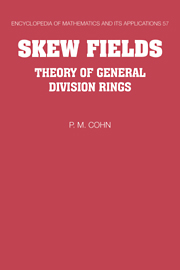Book contents
- Frontmatter
- Contents
- Preface
- Note to the reader
- Prologue
- 1 Rings and their fields of fractions
- 2 Skew polynomial rings and power series rings
- 3 Finite skew field extensions and applications
- 4 Localization
- 5 Coproducts of fields
- 6 General skew fields
- 7 Rational relations and rational identities
- 8 Equations and singularities
- 9 Valuations and orderings on skew fields
- Standard notations
- List of special notations used throughout the text
- Bibliography and author index
- Subject index
2 - Skew polynomial rings and power series rings
Published online by Cambridge University Press: 05 November 2011
- Frontmatter
- Contents
- Preface
- Note to the reader
- Prologue
- 1 Rings and their fields of fractions
- 2 Skew polynomial rings and power series rings
- 3 Finite skew field extensions and applications
- 4 Localization
- 5 Coproducts of fields
- 6 General skew fields
- 7 Rational relations and rational identities
- 8 Equations and singularities
- 9 Valuations and orderings on skew fields
- Standard notations
- List of special notations used throughout the text
- Bibliography and author index
- Subject index
Summary
The true analogue of a polynomial ring in the non-commutative case is the free algebra, or more generally, the tensor ring. But there is a half-way house, rather like the Ore domain (of which it is an instance), namely the skew polynomial ring, which was introduced by Ore [33]. We examine its elementary properties in 2.1 and make a further study of its ideal theory in 2.2. By forming a completion we obtain in 2.3 from a skew polynomial ring a skew power series ring, whose properties in some senses are simpler than for polynomials. This leads in 2.4 to the Malcev–Neumann construction, a far-reaching generalization allowing the group algebra of any totally ordered group to be embedded in a field. With its help we can iterate the skew polynomial ring construction in 2.5 to form the rings first studied by Jategaonkar, which provide a rich source of counter-examples.
The final section 2.6 applies Ore's method to filtered rings whose associated graded ring is an Ore domain. It is shown that the filtered ring can be embedded in a field, constructed as an inverse limit, and this construction is then used to embed the universal associative envelope of any Lie algebra in a field.
Skew polynomial rings
Commutative field extensions are usually constructed as residue-class rings of polynomial rings over a field. For skew fields the polynomial construction is not the most general means of forming an extension, but it is an important special case because it allows Ore's construction from 1.3 to be used; in fact Ore [33] was one of the first to consider skew polynomial rings formally.
- Type
- Chapter
- Information
- Skew FieldsTheory of General Division Rings, pp. 47 - 92Publisher: Cambridge University PressPrint publication year: 1995

